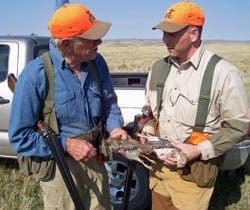After burning my first box and a half of shells in a vain attempt to shoot a ruffed grouse on the wing, I concluded I would never be a wing shot. Each miss added to my frustrations, while deepening my desire to knock one of those winged tricksters out of the air.
My father used a combination of gentle teasing and encouragement to bolster my sagging resolve. His manner of teasing me was rarely hurtful. If his attempt at dispelling the latest miss didn’t work, he didn’t let it pass or lay smoldering. Instead he would chuckle at his own failed attempt and add a few words of encouragement in its place. I never doubted for a minute that he was my best friend and greatest supporter.
One evening, we managed to sneak an hour in the coverts behind our home. Just at twilight, a woodcock flittered up in front of me at ten yards. I pointed and fired the 20-gauge, single-barrel, tightly choked Beretta. Wing-tipped, the woodcock fell back to earth. My father retrieved it before I could recover from my total surprise. It was the first woodcock I ever shot and held in my hands. The long bill and the muted browns and russet colored feathers, delicate legs and feet, seemed to fit perfectly among the frost-bitten apples and leaves of the abandoned tree from which the bird had flushed.
 Woodcock, timberdoodle, #### of the woods, mysterious, ethereal, source of ten thousand stories and the desired quarry of countless men and dogs was now mine. Rather I was his, but I didn’t know it then. All that mattered was that I had broken the ice and shot one in the air. It was only the next day that soberness returned and the realization that any real wing shot couldn’t count himself among that celebrated and exclusive club until he took a ruffed grouse on the wing.
Woodcock, timberdoodle, #### of the woods, mysterious, ethereal, source of ten thousand stories and the desired quarry of countless men and dogs was now mine. Rather I was his, but I didn’t know it then. All that mattered was that I had broken the ice and shot one in the air. It was only the next day that soberness returned and the realization that any real wing shot couldn’t count himself among that celebrated and exclusive club until he took a ruffed grouse on the wing.
Those first few years I was allowed to hunt, my father and I shared the Beretta, taking turns being the hunter and the bird dog. While I believed success lay in the number of squirrels, rabbits and birds I shot, my father’s goal was different. He wished me to become a careful hunter and, more importantly, a thoughtful and decent man.
In November 1960, during another late afternoon hunt as my father was bird-####### the end of a good aspen run, I heard him yell, “Here comes one.”
I mounted the gun just as I saw the grouse crossing to my left through a small opening. Swinging through and past the feathered missile, I fired. Feathers flew and the grouse fell to the ground. I let out a whoop and my father appeared a moment later taking the bird from my hand. Smiling, he looked at me and then at the bird and then back at me.
“I wonder who’s more surprised, you or the grouse,” he queried.
I was by far the most surprised, but I didn’t care because now I could say I shot the “king” of game birds on the wing.
My father grew up during the worst of the Depression, when money and shells were dear. Back then, a grouse or pheasant for the table was the primary goal, whether taken in the air or on the ground. My father knew I might become a wing shot, but he also knew that a bird in the game bag was a boy’s priority. He used a light undemanding hand, free of ethical codes and judgements and showed as much enthusiasm for my successes as I did.
After taking a bird, I counted myself happy regardless of the method I used to kill it, but the desire to be a real wing shot, a man who always took them on the wing, remained with me. When I was 13 and could take a gun out alone, I made a decision to become a bona fide wing shot. The new 16 bore side by side gave me a feeling of confidence. I reasoned that if I missed the bird with the first barrel I would surely get him with the second. But after a number of misses with both barrels, I resorted to ground swatting birds again. Regardless of my method, I liked the feel of a bird in my game bag.
One day as I was nearing the end of a favorite covert, a large #### grouse ran in front of me. I pulled the gun up instantly, but hesitated and lowered it, keeping my eye on the bird. I took one more step. The grouse stopped, tensed and took to the air. Without a thought, I remounted the gun, swung and fired. The bird hit the ground dead.
Grabbing the grouse, I walked home where I found my father in our yard.
“I heard that shot, looks like you got one,” he said.
“Dad, I saw him on the ground and could have shot him there, but I flushed him on purpose and took him in the air,” I replied excitedly.
My father took the grouse from my hand, turned it and spread its tail fan out. “Sure is a nice bird, a real beauty. Took him on the wing did you? Like a real sportsman?”
Then my father said something as much to himself as to me.
“Well Ken, if you treat all the men and women you come into contact with as much fairness and consideration as you did this grouse, you will grow up to be a fine and decent man, one I can be proud of.”
 To me, that meant I would grow up to be a man like my father, and that was something I desired more than a thousand wing-shot grouse. Years later, when I had become adept at wing shooting and even managed to make doubles with some degree of regularity, I ran into two young boys out ground sluicing pheasants the day before the opener for roosters.
To me, that meant I would grow up to be a man like my father, and that was something I desired more than a thousand wing-shot grouse. Years later, when I had become adept at wing shooting and even managed to make doubles with some degree of regularity, I ran into two young boys out ground sluicing pheasants the day before the opener for roosters.
On their father’s orders, the boys were driving an old pickup along the two-track farm roads of the family ranch. He told them to get a few birds before those hunters with fancy dogs and guns came knocking and asking for permission to hunt. The tail feathers sticking out of the five-gallon bucket in the back of the truck was evidence of their success.
They knew I knew what they were up to, but I never said a word. It seemed to me that a handful of pheasants for a landowner that let outsiders hunt wild roosters on the ranch was a small transgression.
“Get any birds,” one of the boys asked.
“Two sharptails and four Huns,” I replied.
“Let’s see them,” they both said.
I took the birds from my vest and showed them, while my hunting partner Tom pulled a few from his coat.
“You air shoot ‘em?” one boy asked, with a sense of the impossible.
“Yep, we air shot them,” Tom replied, keeping a straight face and adding, “The last two Ken got on a covey rise, one with the right barrel and the other with the left.”
“I didn’t think that was possible,” one boy said incredulously.
I just smiled and said, “Well it is; it just takes time and practice.”
Then I thought to myself, “and a whole lot more.” I’ve tried my best, though I’ve failed all too often, to live up to my father’s advice. Shooting birds in the air is easy. Treating my fellows with as much fairness and consideration remains a challenge. If at times I have treated well even those I believed didn’t warrant it, they can thank a #### grouse and a wise and patient father who took his son hunting to learn the lessons of a lifetime.







